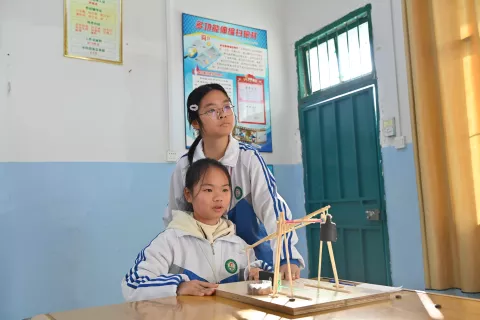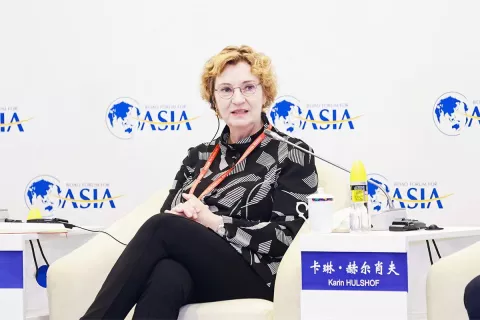The e-parenting initiative that brings left-behind children closer to their parents
The e-parenting initiative that brings left-behind children closer to their parents
- Available in:
- 中文
- English
Despite significant technological advances in recent years, parenting remains one of the hardest and most enduring challenges for many parents. According to the Wall Street Journal, in 2012, its most popular article was not a piece of financial news, but an excerpt from a parenting book. While parenting knowledge has become ever so accessible, majority of migrant worker parents, especially those with overloaded schedules and little domestic help, still find it daunting to effectively handle some of the most basic needs of their children.
The biggest obstacle can often be not being physically present to help them with the daily ups and downs of growing up.
In China, it is estimated that nearly 61 million children are left behind lacking parental care in rural areas. These children are among the 4 out of every 10 children in the country that are affected by internal migration, as one or both of their parents move to cities in search of work and other opportunities.
How do you create a more protective and caring environment for those left behind children whose parents may only return for a few days a year? How do you support and empower those migrant parents who are eager to participate in their children's growth while at the same time scrambling with stressful factory work? To address these questions in a practical way, Center for Child-Rights & Corporate Social Responsibility (CCRCSR) partnered with UNICEF and launched the WeChat e-Learning initiative.
With UNICEF's expertise in Early Childhood Development (click here to visit UNICEF's ECD parenting website) and content development, CCRCSR adapted this ECD knowledge into a series of tailored multimedia tutorials disseminated through WeChat, one of the most widely used social media apps in China. Updated on a weekly basis with animations, quizzes, cartoon lessons and more, the platform aims to inspire and educate workers so that they have the basic skills to deal with common parenting challenges.
28-year-old migrant worker Guan has been following the parenting tutorials closely on this platform where she gained knowledge of pneumonia, HFMD (Hand, Foot and Mouth Disease), diet and so forth. Originally from Henan Province, a 25-hour-train-ride away from her factory in Dongguan, she is the mother of three children aged 5, 9 and 11.
She admits that she didn't have much chance to learn about parenting in the past: “When my children were very young, I took them to the doctor's to get vaccinations. Doctors there would teach me some things about children's health, like nutrition and diet. But after that, there was little opportunity for me to learn more.” During a CCRCSR face-to-face training session in her factory, she learned about the WeChat e-Learning platform and started using it.
In the age of rampant advertising, Guan is mostly concerned with the accuracy and credibility of what she reads online when searching for parenting tips. Faced with an overwhelming amount of information online, she finds relief in the knowledge based content provided by trustworthy sources like UNICEF and the Ministry of Education. Most content on CCRCSR's WeChat e-Learning platform is carefully selected from the parenting portal that UNICEF supports, and presented in an easy-to-understand and engaging way by communication specialists at CCRCSR.
On the platform, there are basic explanations of common diseases like diarrhea, skin rash and trachoma, tips on how to prevent injuries, as well as substantive content on communication with children as a migrant worker. Like many migrant workers' left behind children, Guan's children live with their grandparents. Many of these elderly who still need to work on the farm find it difficult to keep up with daily parenting duties, not to mention modern parenting concepts and best practices.
Recently, 28-year-old factory worker Zeng applied what she learned from the platform during her annual visit home on the Chinese New Year. She said: “When I was back home, l encouraged my boy and girl to brush their teeth every day. I knew that their grandparents didn't help them to establish this habit. In addition, they didn't have the habit of washing hands before meals and after going to the toilet. So I taught them through example. They followed me and learned from me.”
Zeng said the knowledge she gained from the platform helped her to effectively assign parental duties to the children's caregivers and communicate better with them.
Zeng is not alone. Guan also mentioned that grandparents aren't well prepared to assume full parental responsibilities, so she gives a lot of instructions to her children directly. With a good communication mechanism, parents can be “remotely present” in their children's critical development stage under given constraints.
Posts like “Effective long distance communication”, “A list of activities to do with your children during the New Year's holiday”, and “How to say goodbye to your child” offer practical guidance for migrant workers to deal with hard situations and build trust with their children. In these posts, message is crafted with comics and captions to simulate a scene from real life and detailed instructions are given to advise readers on solving specific problems.
Another highlight of this platform is the educational content on child rights, and other broader topics that aim to deepen migrant parents' understanding of parenthood. Many of these workers didn't have much education and are often stressed from their long hours on the job, so on the platform they can learn that their own wellbeing is essential to them maintaining a good relationship with children, as well as tips on how to keep emotional health when they are experiencing a difficult time at work.
To learn more about this WeChat e-Learning platform, please scan the QR code below:
Note: CCRCSR staff Jifang Ma and Elaine Zhou also contributed to this article.




